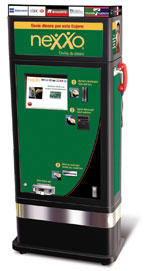A California company is rapidly wiring into Houston and other Sun Belt cities with a self-serve ATM-style kiosk aimed at customers who regularly send cash to family members in Mexico as well as Central and South America.
After completing trials in June, Nexxo Financial Corp. has finished installation of its proprietary software on 43 Houston-area kiosks already designed for bill-paying functions that were installed by Seattle-based TIO Networks Corp. Nexxo officials say they are already looking to partner with other financial institutions and retailers to expand the company's presence in Texas.
The TIO units in the Houston area are located in On the Run and Tiger Mart convenience stores operated by Exxon Mobil Corp., as well as Circle K convenience stores.
The units accept cash, which can be wired to any of 21,000 branches of major Latin American banks such as Mexico's BBVA Bancomer.
San Bruno, Calif.-based Nexxo now has more than 180 kiosk sites across Texas -- in San Antonio, Austin, Dallas-Fort Worth and El Paso in addition to Houston -- and CEO David Alvarez expects that number to increase while the company continues negotiations to extend its reach to other states.
Nexxo has a total of 650 kiosks -- including some of its own design -- handling 50,000 transactions a month in its core markets in California, Texas and Arizona. Installation began about two years ago, just after the software product was introduced. Nevada, Colorado and Florida are at the top of Nexxo's expansion list.
Alvarez says the company spent the first two years after its formation in 2004 focusing on the prepaid credit card market, but found that customers were more interested in international remittance services, so Nexxo changed course.
"The remittance market was part of our initial thinking, but our customers steered us a lot quicker to where we wanted to go," says Alvarez, a former president of San Francisco-based credit-card issuer Providian Financial Corp., which was sold to Washington Mutual Inc. for $6.5 billion in 2005.
Considering the size of the remittance market, it's no wonder Alvarez was eager to switch gears so quickly. The remittance services market to Latin America and the Caribbean is expected to reach $67.5 billion in 2008, according to the Inter-American Development Bank, or IDB. From Texas alone, $4.3 billion in remittances were sent to Latin America this year.
MONEY TALKS
The dominant brick-and-mortar player in the remittance market is Western Union Co., which has spawned smaller copycat competitors. Companies like Nexxo are trying to make money transfer a less cumbersome, more efficient process -- many convenience stores are open 24 hours -- at a competitive price.
Customers can use a cell phone to call a toll-free Nexxo telephone number to set up the transaction, and pay a service charge ranging from $7 to $10 -- depending on the type and/or location of the kiosk -- to transfer as much as $1,000 in cash per transaction, and then get a free five-minute call to the transfer recipient to let them know the transaction was completed. Some of the kiosks include a built-in telephone to make calls.
Alvarez says customers who send money to Mexico or other Latin American countries typically send about $291 per transaction, once or twice a month. More than 75 percent of the 20 million Hispanics who send money to other countries have been in the U.S. more than five years, he says.
"We think this technology can do for the remittance industry what the ATM did for the banking industry. We have a miniscule market share, but we're the future," says Alvarez, who has identified separate niches for potential growth for Nexxo.
John Sexton, chairman and CEO of Houston-based Oasis Bank, which focuses on the Hispanic market, is not surprised that Nexxo is using a technology-driven entry into the remittance market.
"Low- to moderate-income customers are getting more acclimated to technology and are more aware of exchange rates, so it may be something the industry needs when remittance prices are dropping," Sexton says. "I don't really see too much impact with our customers because we're focusing more now on being relationship-oriented rather than transaction-oriented."

Besides partnering with companies like TIO to install Nexxo software on their machines in retail outlets, or installing Nexxo-made kiosks in other locations, Nexxo is also looking to partner with financial services institutions. The company's first deal was inked this year with HSBC Bank USA NA, and kiosks are now installed at three Houston-area HSBC branches.
Still, because its customers -- which Alvarez says are primarily legal residents -- are typically the first affected by a recession, he expects the economy to impact his company's growth. The IDB reports that about 17 percent of remittance-senders are employed in construction, one of the first sectors to feel the effects of a downturn.
In fact, adjusted for inflation, remittances in 2008 will actually contribute 1.7 percent less to recipients' incomes, also partly affected by the weaker U.S. dollar, the IDB says.
Adds Alvarez: "We've grown pretty aggressively in the first two years, but it may slow down to single-digit growth (in 2009) due to the economy. The people at the lower end of the socioeconomic spectrum get hit the fastest."
REMITTANCE MARKET BY THE NUMBERS
$67.5 billion
2008 Texas remittances to Latin America: $4.3 billion
2006 Texas remittances to Latin America: $5.2 billion
Latin adult immigrants in Texas:
2.8 million
Percentage of Texas immigrants that regularly send money out of the country: 30 percent
Source: Inter American Development Bank